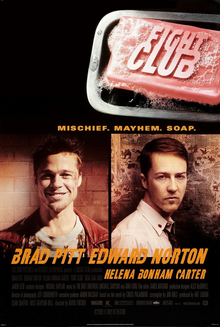
Back نادي القتال Arabic النادي د لمدابزة ARY نادى القتال ARZ Döyüş klubu (film, 1999) Azerbaijani Байцоўскі клуб (фільм) Byelorussian Байцоўскі клюб (фільм) BE-X-OLD Боен клуб (филм) Bulgarian ফাইট ক্লাব (চলচ্চিত্র) Bengali/Bangla Fight Club Catalan Fight Club (pelikula) CEB
| Fight Club | |
|---|---|
 Theatrical release poster | |
| Directed by | David Fincher |
| Screenplay by | Jim Uhls |
| Based on | Fight Club by Chuck Palahniuk |
| Produced by |
|
| Starring | |
| Cinematography | Jeff Cronenweth |
| Edited by | James Haygood |
| Music by | The Dust Brothers |
Production companies |
|
| Distributed by | 20th Century Fox |
Release dates |
|
Running time | 139 minutes[1] |
| Country | United States[nb 1] |
| Language | English |
| Budget | $63–65 million[1][4] |
| Box office | $101.2 million[1] |
Fight Club is a 1999 American film directed by David Fincher, and starring Brad Pitt, Edward Norton and Helena Bonham Carter. It is based on the 1996 novel by Chuck Palahniuk. Norton plays the unnamed narrator, who is discontented with his white-collar job. He forms a "fight club" with soap salesman Tyler Durden (Pitt), and becomes embroiled in a relationship with an impoverished but beguilingly attractive woman, Marla Singer (Bonham Carter).
Palahniuk's novel was optioned by Fox 2000 Pictures producer Laura Ziskin, who hired Jim Uhls to write the film adaptation. Fincher was selected because of his enthusiasm for the story. He developed the script with Uhls and sought screenwriting advice from the cast and others in the film industry. It was filmed in and around Los Angeles from July to December 1998. He and the cast compared the film to Rebel Without a Cause (1955) and The Graduate (1967), with a theme of conflict between Generation X and the value system of advertising.[5][6]
Studio executives did not like the film, and they restructured Fincher's intended marketing campaign to try to reduce anticipated losses. Fight Club premiered at the 56th Venice International Film Festival on September 10, 1999, and was released in the United States on October 15, 1999 by 20th Century Fox. The film failed to meet the studio's expectations at the box office and received polarized reactions from critics. It was ranked as one of the most controversial and talked-about films of the 1990s. However, Fight Club later found commercial success with its home video release, establishing it as a cult classic and causing media to revisit the film. In 2009, on its tenth anniversary, The New York Times dubbed it the "defining cult movie of our time."[7]
- ^ a b c "Fight Club". Box Office Mojo. IMDb. Retrieved April 1, 2022.
- ^ "Fight Club (1999)". British Film Institute. Archived from the original on February 24, 2015. Retrieved February 16, 2015.
- ^ Fight Club at the American Film Institute Catalog
- ^ "Fight Club". The Numbers. Nash Information Services, LLC. Retrieved April 1, 2022.
- ^ Cite error: The named reference
CNN1999was invoked but never defined (see the help page). - ^ Cite error: The named reference
Laistwas invoked but never defined (see the help page). - ^ Lim, Dennis (November 6, 2009). "Forget Rule No. 1: Still Talking About 'Fight Club'". The New York Times. Archived from the original on March 10, 2012. Retrieved July 24, 2019.
Cite error: There are <ref group=nb> tags on this page, but the references will not show without a {{reflist|group=nb}} template (see the help page).
© MMXXIII Rich X Search. We shall prevail. All rights reserved. Rich X Search